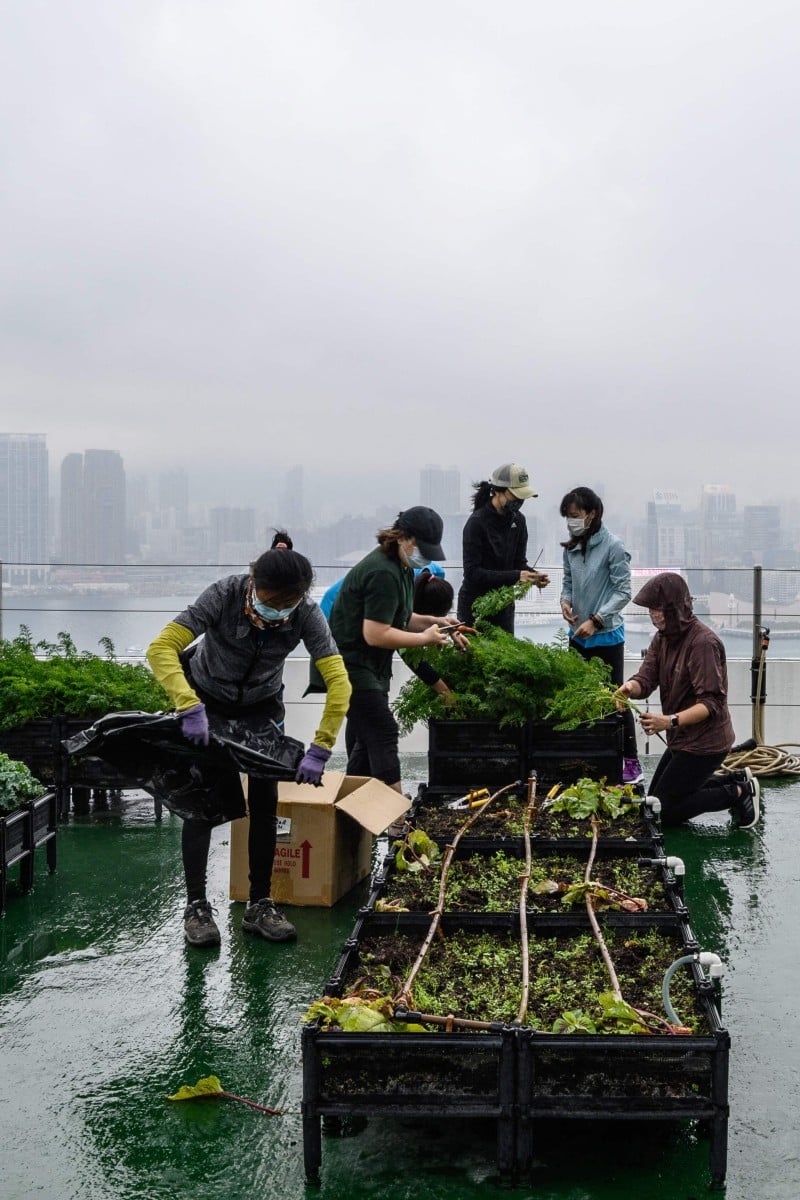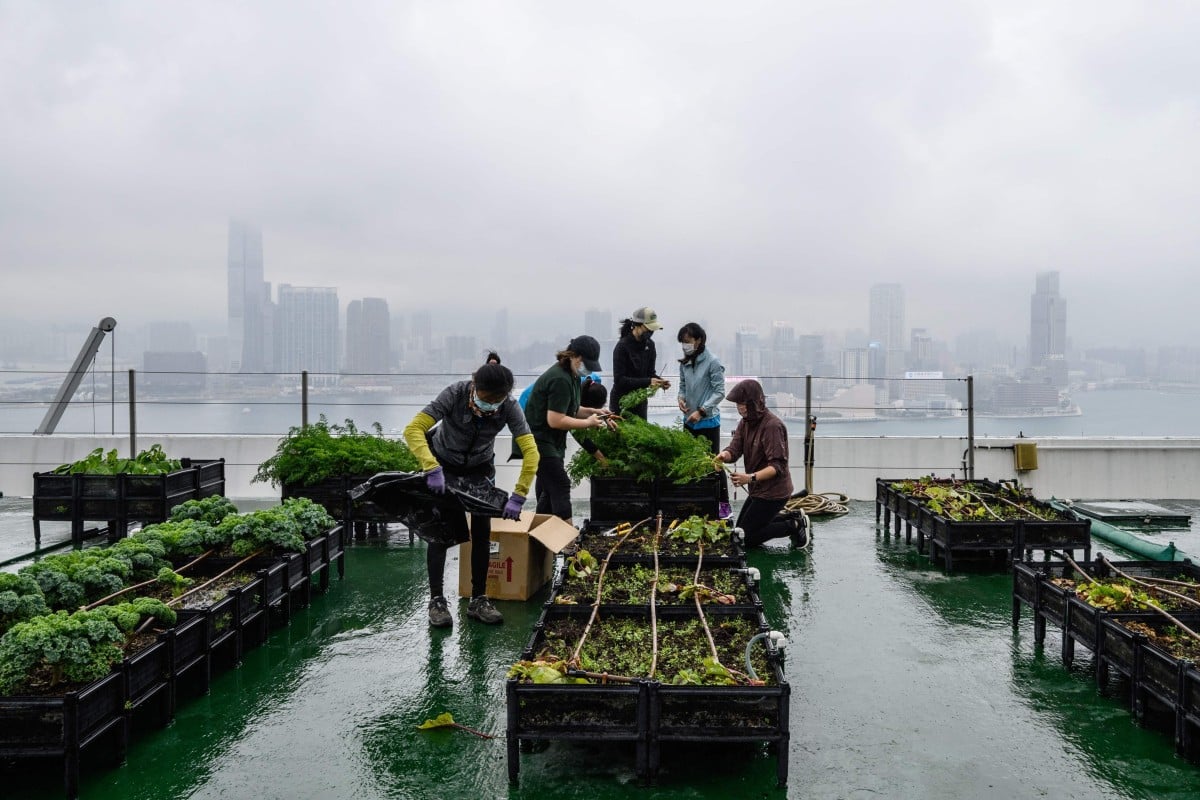
Hong Kong's rooftop urban farms mean gardens in the sky
- Initiatives such as Rooftop Republic take spaces like the tops of skyscrapers and roofs of malls and turn them into community farms
- Hong Kong imports around 90 per cent of its food - mostly from mainland China - and throws out 3,500 tonnes every day
 Urban farmers harvest vegetables grown on a rooftop farm on top of the 150-metre tall Bank of America tower in Hong Kong. More than 60 farms have sprouted across the city since 2015 - on decommissioned helipads, shopping mall rooftops and public terraces - thanks to initiatives like Rooftop Republic, a local social enterprise which promotes urban farming. Photo: AFP
Urban farmers harvest vegetables grown on a rooftop farm on top of the 150-metre tall Bank of America tower in Hong Kong. More than 60 farms have sprouted across the city since 2015 - on decommissioned helipads, shopping mall rooftops and public terraces - thanks to initiatives like Rooftop Republic, a local social enterprise which promotes urban farming. Photo: AFPWith their heads in the clouds and their hands in the soil, a group of office workers is busy harvesting the fruits of their labour on the roof of a Hong Kong skyscraper.
Invisible to those below, a sprawling garden of radishes, carrots and rhubarb is flourishing at the top of the 150-metre tall Bank of America tower, a stark and colourful contrast to the monotone shades of concrete, steel and glass of the city’s financial district.
Island School students launch zero waste initiative
The farm is among more than 60 that have sprouted across the space-starved city since 2015 - on decommissioned helipads, shopping mall rooftops and public terraces - thanks to initiatives like Rooftop Republic, a local social enterprise which promotes urban farming.
Co-founder Andrew Tsui sees rooftop farms as a way for people to reconnect with how sustainable food can be produced in what he calls the current “instant-noodle city lifestyle” that sees so much waste.
A gardener works at the Sky Garden, a 1,200 square-metre rooftop garden on top of the Metropole Plaza shopping mall in Hong Kong. Photo: AFP
“What we are looking at is how to identify underutilised spaces in the city and mobilise the citizens, the people, to learn about food,” the 43-year-old said.
Tsui believes Hongkongers need to re-establish a relationship with what they eat, which has been broken “since we started outsourcing our food and relying so much on industrialised production.”
Steps to making Hong Kong a more sustainable place
Piles of food waste
According to government statistics, Hong Kong throws out some 3,500 tonnes of food waste a day - the equivalent weight of 250 double-decker buses. Less than a quarter is recycled.
And around 90 per cent of the food eaten by the city’s 7.5 million inhabitants is imported, mostly from mainland China.
But while Hong Kong is one of the most densely packed places on earth, there is still considerable space to grow food locally.
The Hong Kong environmental activist who doesn’t drink water
Tsui said some seven million square metres of farmable area is currently cultivated. But more than six million square metres on the city’s rooftops remains unused.
“So we have the potential of doubling the supply of land for growing food,” he said.
“The challenge for us is to design urban farming as a lifestyle to integrate into our daily lives,” he added.
Carrots grown on and harvested from a rooftop farm. Photo: AFP
“And the first step for that, of course, is to be accessible.”
To incorporate urban farms into the blueprints for office buildings, Rooftop Republic closely collaborates with architects, developers and property managers.
Major companies are signing up.
Some UN World Heritage sites are in danger because of climate change
As well as the Bank of America garden, financed by property consultancy giant JLL, Singaporean banking giant DBS has partnered with Rooftop Republic to set up an academy that runs workshops for beginners as well as professional courses.
“In Hong Kong, most people focus on the commercial value of properties. But we want to promote the concept of sustainability,” said Eric Lau, the group’s senior director of property management.
99 of the 100 cities most environmentally at risk are in Asia
New skills
Urban farmers say the projects also help build community spirit among those who cultivate the crops.
After retiring from public service, Lai Yee-man said she turned to farming to connect with nature and her neighbours.
The 60-year-old initially learned techniques and tricks from professionals to develop her farming plot in the New Territories, but now she is passing on her knowledge to fellow residents working the Sky Garden, a 1,200 square-metre facility on top of a mall.
Residential buildings are seen beyond the leaves of plants growing at the Sky Garden at Metropole Plaza. Photo: AFP
There, residents cultivate edible flowers and fruit trees and can attend lifestyle classes like mindful gardening.
“People attach greater importance to their health now, they will buy organic food,” said Lai.
“Here, we teach them not to waste ... and to cherish their food,” she explained, adding that the majority of what the mall farm grows goes to local food banks.
Schools in India make the switch to solar power
Tsui recognises that few young Hongkongers currently have an interest in learning how to grow food.
But younger people are often concerned about the environment and climate change, so the opportunity to generate enthusiasm is there for the taking.
“If coding is the skill set to learn for the 21st century, growing your own food is a necessary new skill that we all need to learn to ensure a regenerative and green planet,” he said.